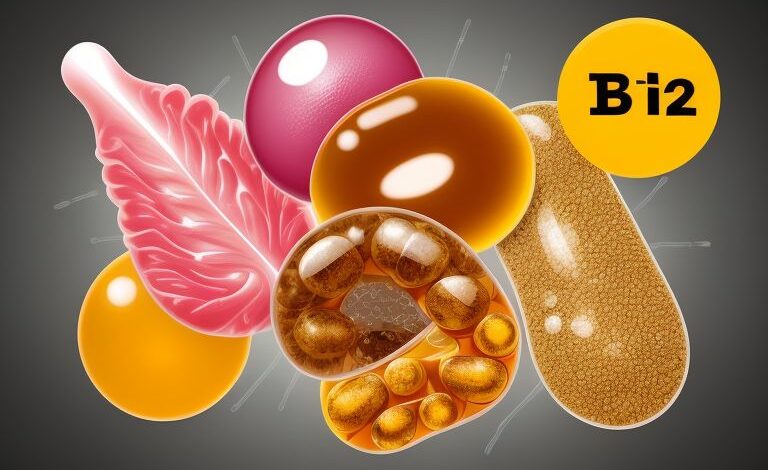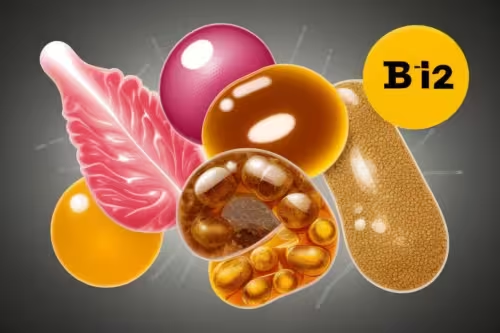High Vitamin B12 Levels Symptoms: Understanding the Signs and Causes

Vitamin B12 is an essential nutrient that plays a critical role in maintaining healthy nerve function, producing red blood cells, and supporting DNA synthesis. While vitamin B12 deficiency is common and well-documented, less attention is given to elevated vitamin B12 levels. High levels of B12 in the blood can sometimes indicate underlying health conditions, and it’s important to understand the symptoms and causes behind this imbalance.

In this article, we’ll explore the symptoms of high vitamin B12 levels, what causes them, and when you should be concerned.
What Is Vitamin B12?
Vitamin B12, also known as cobalamin, is a water-soluble vitamin that is crucial for:
- Nerve health: It helps in the formation and maintenance of myelin, which protects nerve fibers.
- Red blood cell production: Vitamin B12 aids in the development of healthy red blood cells.
- DNA synthesis: It plays a key role in cell division and the creation of DNA.
Vitamin B12 is mainly found in animal-based foods such as meat, fish, dairy, and eggs. Since the body cannot produce B12 on its own, people rely on their diet or supplements to meet their daily requirements.
Causes of High Vitamin B12 Levels
High vitamin B12 levels in the blood are uncommon without external supplementation. Elevated levels may not necessarily indicate that you are overconsuming B12, but rather, that there is an underlying issue. Some of the most common causes include:
1. Supplementation
Overconsumption of vitamin B12 supplements can lead to high serum levels, although this is rare because excess B12 is typically excreted through urine. However, if you are taking high doses of B12 in the form of injections or supplements, your blood levels may rise temporarily.
2. Liver Disease
The liver stores significant amounts of vitamin B12. Conditions such as cirrhosis or hepatitis can lead to the release of stored B12 into the bloodstream, resulting in elevated levels.
3. Kidney Disease
Impaired kidney function can prevent the proper excretion of vitamin B12, leading to its buildup in the blood. This is why people with chronic kidney disease may experience high B12 levels.
4. Leukemia or Blood Disorders
Certain blood disorders, including leukemia or polycythemia vera, can cause elevated levels of vitamin B12 in the blood due to increased production of red blood cells or other related factors.
5. Cancer
Increased levels of vitamin B12 have been observed in some cancer patients, particularly those with liver cancer, pancreatic cancer, or gastrointestinal tumors. Elevated B12 levels may reflect an increase in the production of binding proteins due to the cancer.
6. Bacterial Overgrowth
Certain infections, including bacterial overgrowth in the intestines, can lead to elevated B12 levels. This happens when bacteria produce extra B12, which is absorbed into the bloodstream.
Symptoms of High Vitamin B12 Levels
In most cases, high vitamin B12 levels do not produce specific symptoms on their own. Unlike deficiencies, which can cause clear and direct health issues, elevated B12 levels often point to other underlying health problems rather than causing issues by themselves.
However, if high B12 levels are associated with underlying health conditions, you may experience symptoms linked to those conditions. Here are some signs that might accompany high vitamin B12 levels:
1. Fatigue and Weakness
Fatigue and generalized weakness are common symptoms of many conditions related to high B12 levels, particularly liver or kidney disease. If you’re experiencing consistent tiredness, it’s important to have your B12 levels checked as part of a broader health evaluation.
2. Nausea and Diarrhea
Digestive issues such as nausea, vomiting, or diarrhea may occur if high B12 levels are linked to gastrointestinal problems like liver disease or infections. These symptoms are often more associated with the underlying condition rather than B12 itself.
3. Skin Reactions
Although rare, some individuals may experience skin issues such as rashes or acne due to high vitamin B12 levels from supplements. This is particularly true for people who have a sensitivity to synthetic forms of B12, like cyanocobalamin.
4. Numbness or Tingling
While vitamin B12 deficiency is more often associated with nerve damage and resulting numbness, some people with high B12 levels report similar symptoms. This can be indicative of nerve-related issues connected to underlying diseases like diabetes or kidney problems.
5. Headaches and Dizziness
Headaches, dizziness, or a feeling of being “lightheaded” can also occur with high B12 levels. These symptoms are non-specific but can be linked to the underlying conditions that cause elevated B12.
6. Jaundice
If your elevated B12 levels are due to liver disease, you may experience jaundice, a yellowing of the skin and eyes. This occurs when the liver isn’t functioning properly and is not directly caused by high B12 but is often seen in conditions that lead to increased B12 in the blood.
Potential Risks of High Vitamin B12 Levels
Though rare, excessively high B12 levels can sometimes lead to health risks, especially when associated with underlying conditions. Here are some potential risks linked to elevated B12 levels:
1. Worsening of Pre-Existing Conditions
High levels of vitamin B12 may indicate worsening kidney or liver function, particularly in those with pre-existing disease. Monitoring B12 levels in these patients is important for tracking their overall health.
2. Increased Risk of Blood Clots
In some cases, elevated B12 levels have been linked to an increased risk of blood clots, especially in patients with certain types of cancer or blood disorders. This is a serious condition that requires immediate medical attention.
3. Complications in Cancer Patients
High vitamin B12 levels in cancer patients may reflect tumor progression. This is why physicians often monitor B12 levels as part of a larger set of diagnostic tests.
When to See a Doctor
If you’ve been diagnosed with high vitamin B12 levels, it’s important to consult your healthcare provider to determine the underlying cause. High B12 levels are often a symptom of another condition rather than a problem in and of themselves. Your doctor may perform additional tests to identify any potential liver, kidney, or blood disorders that could be responsible for the elevated levels.
How to Manage and Treat High Vitamin B12 Levels
Managing high vitamin B12 levels often depends on treating the underlying condition. Here are some ways to address elevated B12:
1. Adjust Supplement Intake
If your high B12 levels are due to supplements, reducing your dosage may bring your levels back to normal. However, always consult a healthcare provider before making changes to your supplementation.
2. Treat Underlying Conditions
Addressing liver disease, kidney dysfunction, or blood disorders is crucial for normalizing B12 levels. Treating these conditions may require medication, dietary changes, or other therapies.
3. Regular Monitoring
For individuals with chronic health issues, regular blood tests can help monitor B12 levels and ensure that any changes in levels are managed early.
Frequently Asked Questions (FAQ)
1. Can high vitamin B12 levels cause toxicity?
No, vitamin B12 is water-soluble, meaning that excess amounts are typically excreted through urine. However, high levels in the blood may indicate an underlying health condition.
2. Can high vitamin B12 levels affect my mood?
There is no direct evidence that elevated B12 levels affect mood. However, mood changes can be linked to underlying health issues associated with high B12 levels, such as liver or kidney disease.
3. What is considered a high vitamin B12 level?
A normal range for vitamin B12 in the blood is typically between 190 to 950 picograms per milliliter (pg/mL). Levels above 950 pg/mL may be considered high, depending on the individual’s health status and the laboratory’s reference range.
4. How can I prevent high vitamin B12 levels?
For most people, high vitamin B12 levels are not a concern unless caused by supplementation or an underlying condition. Limiting unnecessary supplements and maintaining regular health check-ups can help prevent high levels.
5. Can high vitamin B12 levels indicate cancer?
Elevated B12 levels can sometimes be linked to certain types of cancer, such as liver or blood cancers. However, high B12 alone is not a definitive indicator of cancer, and further testing is necessary.
High vitamin B12 levels are typically a sign of an underlying issue rather than a direct cause of concern. By understanding the symptoms and working closely with a healthcare provider, you can identify the root cause and take appropriate action to maintain optimal health.
